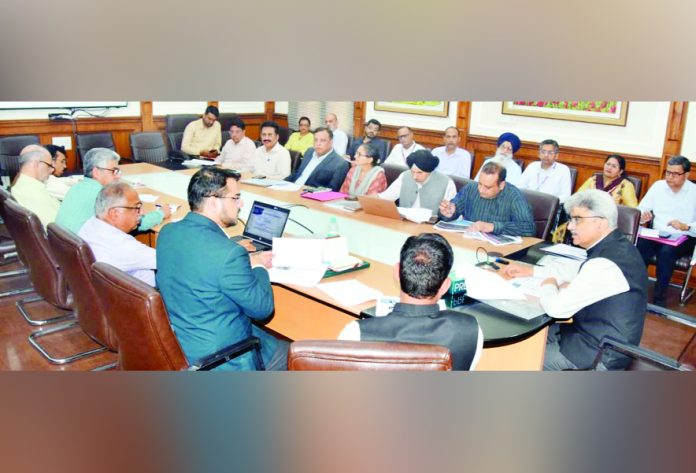- Over 1400 JPDCL consumers get zero bills post RTS installation under PMSGY
Excelsior Correspondent
JAMMU, Mar 25: Chief Secretary, Atal Dulloo, today chaired a UT Level Coordination Committee (UTLCC) meeting of the PM Surya Ghar Muft Bijli Yojana.
He emphasised upon brisk awareness generation for optimal utilisation of benefits by public being offered under this flagship scheme.
The meeting besides Principal Secretary, PDD and Commissioner Secretary, IT Department was attended by Deputy Commissioners; MD, JPDCL/ KPDCL; CEO, JAKEDA; Chief Engineers of JPDCL/ KPDCL and representatives from NHPC and other implementation agencies.
The Chief Secretary urged the two DISCOMS to make their ground level staff responsible for creating awareness among the general public. He also advised them to encourage the registered consumers to make agreements followed by payments and assist them in subsequent installation of Rooftop Solar (RTS) plants through the choosen vendors.
He stressed on making all the success stories public where people had been successful in reducing their energy bills substantially. He further asked for reducing the waiting period for the consumers after submission of applications on their part and swift disbursal of subsidy into their accounts.
Regarding solarisation of government buildings, he underscored the need for allotment of all the works proposed under Capex and bringing pace in implementation of RESCO model on the ground. He called upon the JAKEDA to closely monitor the progress and take weekly appraisals to enhance its implementation here.
Earlier, Principal Secretary, PDD, H.Rajesh Prasad, informed the meeting about the achievements of the Department in implementation of this scheme. He made out that PM-Surya Ghar Yojana is a key flagship program to boost solar energy use by the domestic consumers across the country.
The Principal Secretary further remarked that this initiative has attracted widespread participation, with the Jammu Power Distribution Corporation Limited (JPDCL) receiving 19,076 applications, equivalent to 66.77 MW of solar capacity. The Kashmir Power Distribution Corporation Limited (KPDCL) has recorded 17,746 applications, totalling 56.787 MW across the region.
About the phenomenal success of this scheme, Managing Director, JPDCL, Choudhary Yasin, informed the meeting that 1438 consumers had received zero sum bills for their consumption due to RTS installed in their homes.
He further made out that, on an average, 47 SRTs are installed daily with a commissioning rate of 54 SRTs per day with 294 and 202 consumers already disbursed Centre and UT subsidy respectively in their bank accounts.
MD, KPDCL, Mehmood Ahmad Shah, revealed that under this scheme, KPDCL has completed 1,199 installations, so far.
Giving district-wise highlights, he informed that Budgam leads with 16.07% progress (95 installations). He made out that with improvement in weather conditions the pace would increase considerably now.
Meanwhile, JPDCL reported 1,573 installations with district Kishtwar topping the list with 88 installations.
Additionally, 14,961 applicants have chosen vendors for their solar setups, 9,410 under JPDCL and 5,551 under KPDCL, while subsidies have been disbursed to 1,144 consumers, including 294 in JPDCL and 850 in KPDCL areas.
It was added that the financial backing under PMSGY had been robust, with JPDCL processing 1,568 bank accounts and disbursing Rs 2,654.38 lakh across Jammu districts from October 31, 2024 to March 21, 2025. Similarly, in Kashmir, KPDCL has handled 942 accounts, releasing Rs 1,847.19 lakh by March 10, 2025.
Parallel to the PM-Surya Ghar scheme, Commissioner Secretary, IT Department, Saurabh Bhagat,revealed that the solarization of Government buildings in the UT is advancing rapidly.
Out of 22,494 buildings proposed for solar upgrades, 12,994 are being tackled under the Capex mode with 4,673 already completed, boasting a capacity of 39.6 Mega Watts (MW). An additional 9,500 buildings are slated for the RESCO (Renewable Energy Service Company) mode, targeting a tentative capacity of 200 MW, he informed.


